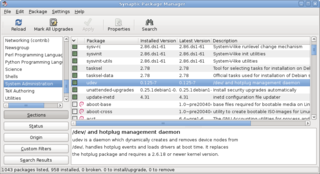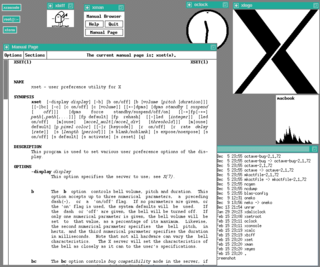The Comprehensive Perl Archive Network (CPAN) is a repository of over 250,000 software modules and accompanying documentation for 39,000 distributions, written in the Perl programming language by over 12,000 contributors. CPAN can denote either the archive network or the Perl program that acts as an interface to the network and as an automated software installer. Most software on CPAN is free and open source software.

Ruby is an interpreted, high-level, general-purpose programming language which supports multiple programming paradigms. It was designed with an emphasis on programming productivity and simplicity. In Ruby, everything is an object, including primitive data types. It was developed in the mid-1990s by Yukihiro "Matz" Matsumoto in Japan.

A package manager or package-management system is a collection of software tools that automates the process of installing, upgrading, configuring, and removing computer programs for a computer in a consistent manner.

Advanced package tool, or APT, is a free-software user interface that works with core libraries to handle the installation and removal of software on Debian, and Debian-based Linux distributions. APT simplifies the process of managing software on Unix-like computer systems by automating the retrieval, configuration and installation of software packages, either from precompiled files or by compiling source code.

The Microsoft Windows Script Host (WSH) is an automation technology for Microsoft Windows operating systems that provides scripting abilities comparable to batch files, but with a wider range of supported features. This tool was first provided on Windows 95 after Build 950a on the installation discs as an optional installation configurable and installable by means of the Control Panel, and then a standard component of Windows 98 and subsequent and Windows NT 4.0 Build 1381 and by means of Service Pack 4. The WSH is also a means of automation for Internet Explorer via the installed WSH engines from IE Version 3.0 onwards; at this time VBScript became means of automation for Microsoft Outlook 97. The WSH is also an optional install provided with a VBScript and JScript engine for Windows CE 3.0 and following and some third-party engines including Rexx and other forms of Basic are also available.
A desk accessory (DA) or desklet in computing is a small transient or auxiliary application that can be run concurrently in a desktop environment with any other application on the system. Early examples, such as Sidekick and Macintosh desk accessories, used special programming models to provide a small degree of multitasking on systems that initially did not have any other multitasking ability.
Installation of a computer program, is the act of making the program ready for execution. Installation refers to the particular configuration of software or hardware with a view to making it usable with the computer. A soft or digital copy of the piece of software (program) is needed to install it. There are different processes of installing a piece of software (program). Because the process varies for each program and each computer, programs often come with an installer, a specialised program responsible for doing whatever is needed for the installation. Installation may be part of a larger software deployment process.
Maven is a build automation tool used primarily for Java projects. Maven can also be used to build and manage projects written in C#, Ruby, Scala, and other languages. The Maven project is hosted by The Apache Software Foundation, where it was formerly part of the Jakarta Project.

MacPorts, formerly DarwinPorts, is a package manager for macOS and Darwin. It is an open-source software project that aims to simplify the installation of other open source software. It is similar in function to Fink and the BSD ports collections.
JRuby is an implementation of the Ruby programming language atop the Java Virtual Machine, written largely in Java. It is free software released under a three-way EPL/GPL/LGPL license. JRuby is tightly integrated with Java to allow the embedding of the interpreter into any Java application with full two-way access between the Java and the Ruby code.
Jikes Research Virtual Machine is a mature virtual machine that runs programs written for the Java platform. Unlike most other Java virtual machines (JVMs), it is written in the programming language Java, in a style of implementation termed meta-circular. It is free and open source software released under an Eclipse Public License.

In computing, a shell is a computer program that exposes an operating system's services to a human user or other programs. In general, operating system shells use either a command-line interface (CLI) or graphical user interface (GUI), depending on a computer's role and particular operation. It is named a shell because it is the outermost layer around the operating system.
RubyGems is a package manager for the Ruby programming language that provides a standard format for distributing Ruby programs and libraries, a tool designed to easily manage the installation of gems, and a server for distributing them. It was created by Chad Fowler, Jim Weirich, David Alan Black, Paul Brannan and Richard Kilmer during RubyConf 2004.
Rubinius is an alternative Ruby implementation created by Evan Phoenix. Based loosely on the Smalltalk-80 Blue Book design, Rubinius seeks to "provide a rich, high-performance environment for running Ruby code."
A software repository, or repo for short, is a storage location for software packages. Often a table of contents is also stored, along with metadata. A software repository is typically managed by source or version control, or repository managers. Package managers allow automatically installing and updating repositories, sometimes called "packages".
RSpec is a computer domain-specific language (DSL) testing tool written in the programming language Ruby to test Ruby code. It is a behavior-driven development (BDD) framework which is extensively used in production applications. The basic idea behind this concept is that of test-driven development (TDD) where the tests are written first and the development is based on writing just enough code that will fulfill those tests followed by refactoring. It contains its own mocking framework that is fully integrated into the framework based upon JMock. The simplicity in the RSpec syntax makes it one of the popular testing tools for Ruby applications. The RSpec tool can be used by installing the rspec gem which consists of three other gems, namely rspec-core, rspec-expectation and rspec-mock.

MagLev is an alternative implementation of the Ruby programming language built on the GemStone/S virtual machine from GemTalk Systems. Much of Maglev was set out to be written in Ruby as much as possible, resulting in some collaboration with the Rubinius project. As of the first beta release, the project runs RubyGems 1.3.5 natively, with support for C and Smalltalk extensions. MagLev has a distinct VM architecture that allows it to share code and data between runtimes and execution cycles through a Ruby API.
CocoaPods is an application level dependency manager for Objective-C, Swift and any other languages that run on the Objective-C runtime, such as RubyMotion, that provides a standard format for managing external libraries. It was developed by Eloy Durán and Fabio Pelosin, who continue to manage the project with the help and contributions of many others. They began development in August 2011 and made the first public release on September 1, 2011. CocoaPods is strongly inspired by a combination of the Ruby projects RubyGems and Bundler.

Termux is a free and open-source terminal emulator for Android which allows for running a Linux environment on an Android device. Termux installs a minimal base system automatically; additional packages are available using its package manager, based on Debian's.







